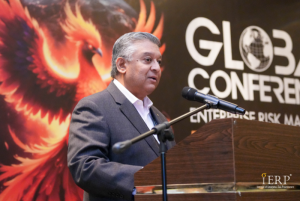Volatility, uncertainty, complexity, ambiguity. We have been in a VUCA world for a long time, and – more importantly – dealing with issues it has thrown up sometimes without fully realising it. If the term seems more visible now, it is only because we are becoming more cognisant of the “big picture” and how VUCA actually affects everyone. Covid-19 and its accompanying devastation has had the effect of focusing attention on the extent of this disruption in everyone’s lives, and increasing the unpredictability of the world at large. Amid the chaos, one fact has stood out from all others: the need for transformative change, and how it will need to be managed, if we are to survive this VUCA world.
What businesses need to do, suggested Friday Concepts Group MD Ramesh Pillai, is find a way to take all that has been learned and drive the development of value of risk management. “The world has been dealing with VUCA before the term was coined,” he pointed out. His session, “Delighting in the Possible,” at the recent IERP Global Conference 2020, openly acknowledged that today’s problems are growing increasingly challenging. “The environment today is complex, and generates “wicked” problems – large, intractable challenges with many dimensions,” he said.
“There are many unknowns, and their velocity, the speed and frequency of how and when they occur, is increasing.”
This unpredictability demands a shift in mindset; we need to move beyond merely managing the probable. The multi-dimensional problems that confront us now need creative, powerful solutions that often have no precedent. “They are driven by interdependencies and are difficult to predict,” Ramesh said. “We cannot avoid surprises.” But what we can do, to avoid being too badly blindsided, is to be prepared. We need to arm ourselves with resources and reserves that are available to us at the moment, and work out how to optimise them in the face of uncertainty. More than this, we will have to get used to living outside our comfort zones.
But in an overwhelmingly unpredictable environment that is harrying us along at breakneck speed, where do we even start? “Ask different questions,” Ramesh said. “It allows us time to deal with the problem, see different perspectives, widen our horizons, and see more solutions.” Thinking in new ways may go a long way; sometimes it is the small moves that end up making all the difference. Identifying interconnectedness is imperative in today’s environment. Because of this inherent interconnectedness and interdependencies, the smallest shift may sometimes have the most unexpected and significant consequences.
The more questions we ask, the more our body of knowledge grows, and the more experiences we are able to incorporate into our understanding of what we should prepare for. Based on what has gone before, we can devise how to stretch our capabilities. Even feedback from disgruntled customers is important; this red-flags the pitfalls that we should avoid. Pitfalls and potholes can be a drain on increasingly scarce resources but incorporating multiple perspectives automatically opens up new possibilities. These could point to opportunity amid adversity, and spur organisational development of agility, flexibility and the ability to pivot rapidly for competitive advantage.
Truly transformative change cannot follow traditional methods, but these cannot be completely discarded either. Instead, organisations could set up small “safe to fail” experiments to gauge their competence in managing business in a new and ragingly dynamic environment. New challenges push us out of our comfort zones; we tend to revert to how we have always managed problems, and fail to apply unusual solutions. If we refuse to look at new ways of doing things, we are limiting ourselves and our capacity to succeed.
“We can hold on to opposing ideas without agreeing to them,” pointed out Ramesh. “Just take what works.”
But being able to do this means developing the ability to discern what will work, and what won’t. In the process, some things may become evident. For example, while change may be inevitable, it may not always be effective or practical to lead transformation from the front. Sometimes it works better if staff at other levels, not just senior management, are empowered to lead. Neither the Board nor senior management can claim to know everything about an organisation, but leveraging on institutional history through its employees may be the best way forward. Empowering employees also encourages more extensive job engagement, besides instilling pride and a deeper sense of purpose.
Many things are required when dealing with transformative change – among them an enquiring mind, diplomacy and integrity. Good management skills alone will not be enough. What bolsters it will be the tone from the top, which has to be reflected by the echo from the bottom, to be effective. High on the list of requirements are a strong moral compass and robust core values, in addition to being forward-thinking. The much-vaunted “New Normal” is already here, concluded Ramesh. The Next Normal is what organisations need to aim and plan for.


























